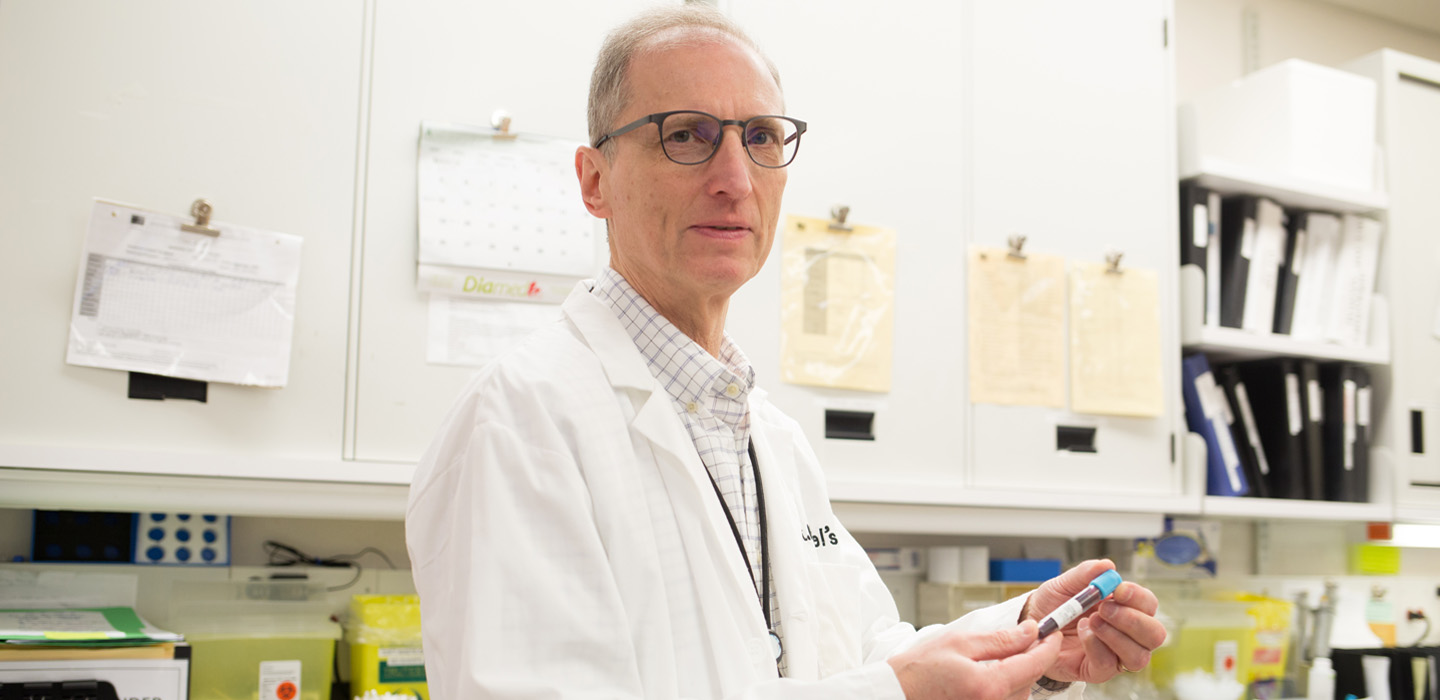
Dr. Jerry Teitel examines a blood sample from one of his patients. Dr. Teitel is a collaborator with a U.S.-based gene therapy trial for hemophiliacs. (Photo by Katie Cooper)
By Leslie Shepherd
People with severe hemophilia don’t produce enough clotting proteins on their own, requiring regular infusions in order to prevent or control bleeding. While safe and effective, the infusions can be expensive and time-consuming, and repeated bleeds can result in damaged joints.
Hemophilia patients from St. Michael’s Hospital are taking part in a small gene therapy trial based in the United States, in which participants have gone weeks, months and in one case a year without any bleeds.
“The results so far are wonderful, even better than what we had dared to hope,” said Dr. Jerry Teitel, medical director of the Hemophilia Treatment Program at St. Michael’s. Dr. Teitel, who is a collaborator with the lead researchers at the Children’s Hospital in Philadelphia, called it a “revolutionary therapy.”
Hemophilia is a rare and potentially fatal genetic disorder in which people – specifically males — lack a blood clotting factor, or protein, such that they can suffer prolonged or uncontrollable bleeding, spontaneously or after minor injuries. It affects about 3,100 Canadians. People with severe hemophilia often bleed spontaneously into their muscles or joints.
Dr. Teitel said preliminary data from the first nine patients suggests that a single dose of the experimental gene therapy may help patients with hemophilia B, who have a deficiency of blood clotting factor IX. He stressed that the treatment was still experimental and that the long-term effectiveness and safety had not been proven. Of the nine patients, four are Canadian, from St. Michael’s.
| Did you know? Hemophilia is often referred to as the royal disease. Queen Victoria was a carrier of a rare form of the disease and passed the mutation to various royal houses across Europe through two of her five daughters. |
One of those patients, John Konduros, 53, a bakery owner from Cambridge, Ont., hasn’t had a bleed or a need for treatment since his gene therapy on June 6, 2016. The IV procedure took about one hour. In the IV bag were engineered genes encased in inactivated viruses that signaled his body to produce its own clotting factor IX.
Konduros was diagnosed with hemophilia shortly after he was born, as his older brother also had the disease, so he has spent a lifetime being careful not to hurt himself. When he hit himself shoveling snow a couple of years ago he was in hospital for 10 days and couldn’t walk properly for six months.
He said the gene therapy has made him less anxious about the future.
“You spend so much time looking after yourself, avoiding injuries, that to have no bleeds nine to 10 months later is almost too good to be true,” he said. “It’s still hard for me to believe. You go in for a one-hour IV drip and, like one of the doctors in Philadelphia said, ‘You leave your hemophilia at the door.’ “
About St. Michael’s Hospital
St. Michael’s Hospital provides compassionate care to all who enter its doors. The hospital also provides outstanding medical education to future health care professionals in 27 academic disciplines. Critical care and trauma, heart disease, neurosurgery, diabetes, cancer care, care of the homeless and global health are among the hospital’s recognized areas of expertise. Through the Keenan Research Centre and the Li Ka Shing International Healthcare Education Centre, which make up the Li Ka Shing Knowledge Institute, research and education at St. Michael’s Hospital are recognized and make an impact around the world. Founded in 1892, the hospital is fully affiliated with the University of Toronto.
